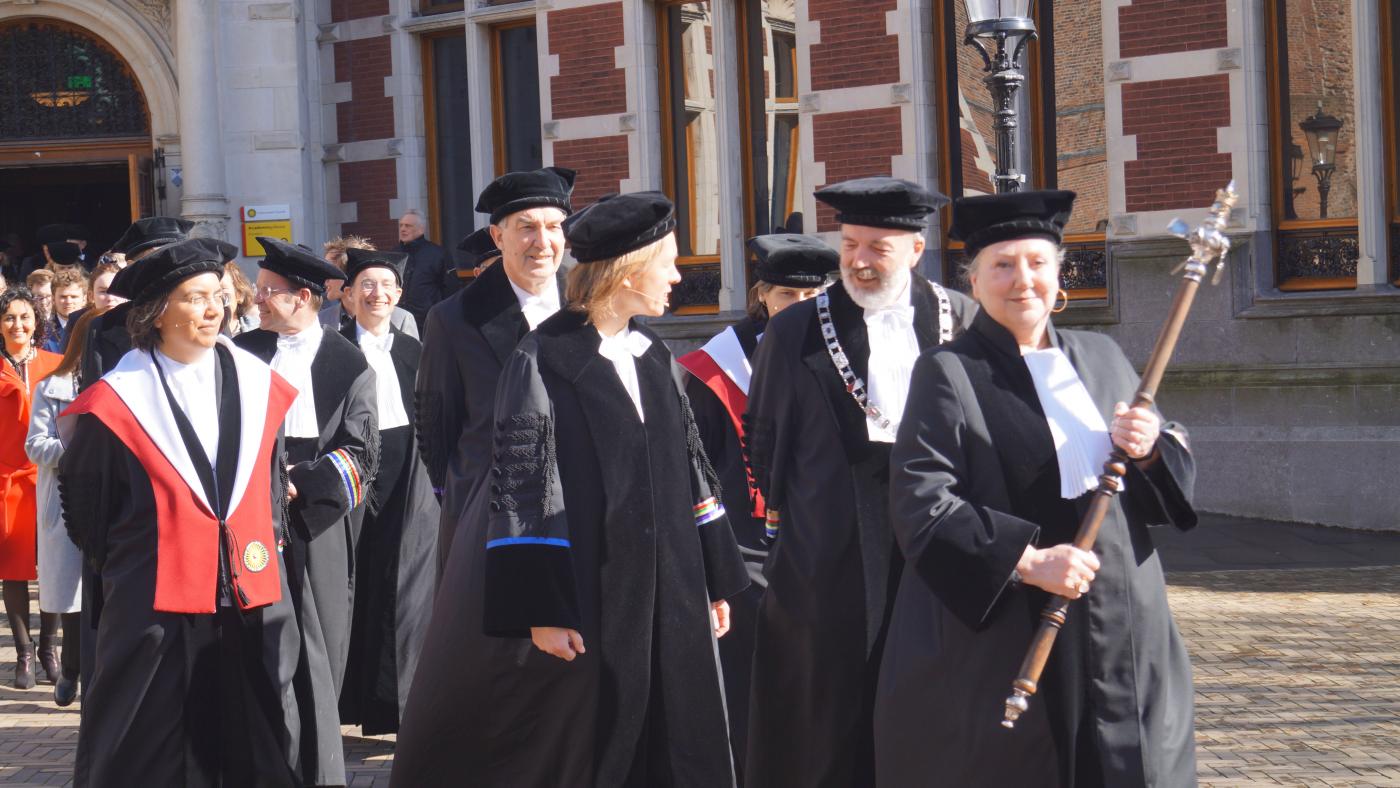Cold Domkerk as setting dies celebration
Climate crisis: ‘The penny seems to have dropped’

The dies celebration occurred after a weekend in which scientists were involved in the blockade of Eindhoven airport. In addition, statues of renowned ancestors were blindfolded in several cities to spare them the sight of the earth's demise. Afterwards, protesters also lined up at the door of the Dom Church shouting slogans like 'UU cut all ties with fossil fuels'.
The theme of the celebration, 'Climate crisis: between reflection and action' is very up-to-date. In his opening address, Rector Kummeling referred to the dismay among Dutch scientists after the last Provincial Council elections. He expressed the hope that the result was mainly due to the government's policies, not a complete denial of the nitrogen and climate crisis. "I remain optimistic."
Before that, Kummeling had apologised for the fact that the heating in the Domkerk would remain off. It is a small contribution by the university to the fight for a better climate. Those who could get their hands on one of the available blankets were lucky.
Knowledge about the climate problem
The rector emphasised that the UU contributes to increasing knowledge about the climate problem through numerous scientific disciplines and initiatives. But he also made clear that within the university itself, there are sometimes discussions about the best ways to use that scientific knowledge.
For example, on the desirability of cooperation with fossil companies, the opposing views came to the fore prominently during a debate the UU recently held on the subject. "But what has stayed with me most is the sense of urgency among all those present, regardless of the beliefs they have about exactly what needs to be done to contain the climate crisis."
‘A crisis is an emergency’
The fact that the university uses the term "climate crisis" in a theme for a dies celebration is significant, said dies speaker Liesbeth van de Grift, professor of International History in relation to the environment. A few years ago, the university would probably not have dared to do so.
"It is my hypothesis that this change is not because of new scientific insights. Or because climate change itself has changed its nature so much in a few years. The use of the term indicates a changed 'problem conception' on the part of the Executive Board itself."
In her speech, the historian outlined the overriding post-WWII worldview in which heavy industry and intensification of agriculture and animal husbandry equalled prosperity and progress. Now that nature is hitting the brakes, that has to change.
Van de Grift also views the changed attitude of the university board as evidence of a greater sense of urgency. She expects to see that reflected in university policy. "A crisis is an emergency. Speaking about climate change in these terms sends a message that business as usual is no longer a possibility."
IPCC report
The words of thanks from the two honorary doctors also expressed the conviction that the role of scientists can no longer be limited to researching, analysing and explaining.
Professor of Land-Climate Dynamics at ETH Zurich Sonia Seneviratne, a pioneer in research on the origins of heat waves and droughts and one of the authors of the latest IPCC report, called unequivocally on universities and scientists to take action.
"Why should scientists provide the best possible information to society if we are not prepared to act on it?" she wondered. Then, point by point, she listed what frightening facts the IPCC report has now established, each point starting with 'we know that ...'
With that knowledge, she said, universities can do nothing but take a leadership role and show society the way. "As the famous words of Greta Thunberg read, 'No one is too small to make a difference'. That applies to every one of us - every scientist, every professor, every student and every citizen can make a difference'."
'Paris agreement is a masterpiece'
According to Professor of Climate Change Science at the University of East Anglia in Norwich, Corrine le Quéré, renowned global carbon cycle expert, we live in a "scary" period where the world must learn to contain itself. This must include collective action. However, she expressed remarkable optimism.
After all, these times also offer opportunities to shape the future. And that, she said, is happening in abundance. She pronounced her appreciation for the efforts of scientists, diplomats and also politicians, and she called the Paris Agreement "a masterpiece whose results we are already seeing".
Utrecht at sea
Although it did not become entirely concrete during the afternoon exactly how scientists and universities could take action in different ways than they already often do, they were all encouraging and motivating words.
In his closing remarks, college president Anton Pijpers expressed the hope that in 387 years’ time, Utrecht University's birthday will not have to be celebrated in 'Utrecht at Sea' or worse, 'in a kind of Atlantis'. He also felt that UU should take steps that fit a 'sense of crisis'.
As a new small step, he announced the establishment of a Utrecht Student Tree Fund. Money from donors will finance projects to plant new trees. And then it was on to the drinks.